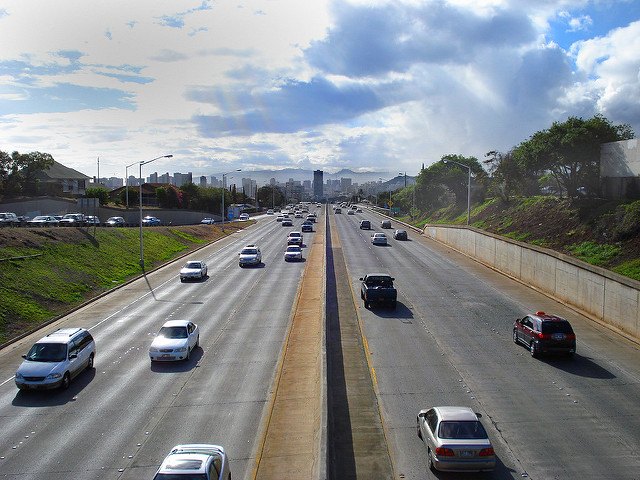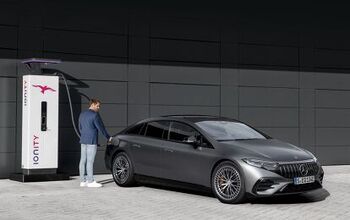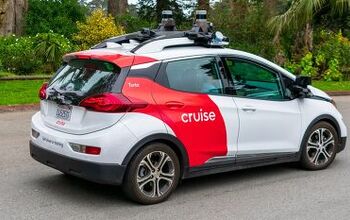Yet More Evidence That America's Car Addiction Is Not About To Die

New York City and San Francisco, besides having the most tailored beards and bike activists on both coasts (Note: Portland might have something to say about this) might not like some of the data emerging from the University of Michigan.
While some Millennials, especially ones working at startups and paying the equivalent of a Cadillac for a shoebox apartment in a trendy, upcoming part of their building, might think personal car ownership is as dated a concept as VCR tapes and telephone banking, there’s a vast gulf between that lifestyle and that of the average American. It’s clear to see in the U-M Transportation Research Institute’s latest findings.
The data also pours a cold glass of asparagus water over an earlier poll that suggests we’re poised to kick car ownership to the curb.
The contrast between the two studies, illustrated by Automotive News, can’t be denied. Early last year, a Reuters/Ipsos opinion poll asked those who traded in or sold a vehicle in the previous 12 months what they ended up driving. Some 9 percent of respondents claimed they didn’t pick up a new car — ride services and carsharing filled in the vehicular absence.
Roughly the same number of respondents who planned to get rid of their car in the next 12 months claimed they’d go the mobility route, too.
Naturally, the Reuters piece profiled one such American who made the switch to modern mobility. A Michigan expat living in New York City discovered owning a car in New York City was a pain in the ass, and an expensive one at that. After jettisoning his car, lo and behold, the man soon discovered his pockets bulging with saved cash. Choosing mobility options meant his monthly car budget sank from $820 a month to $250 a month.
Who wouldn’t expect this? Living in a congested city with stratospheric rents and expensive (and severely limited) parking, coupled with nearby rapid transit and multiple mobility offerings, just might compel someone to walk away from their car — if not for convenience than for fiscal salvation.
The U-M study paints a different picture, though. As use of carsharing and ride services like Uber and Lyft increases (in some cases, just to avoid taxi company gouging and slow bus travel), personal car ownership rates have climbed for the past four years, now sitting at the highest point since the recession.
In 2016, the ownership rate per person was 0.766, while the household rate was 1.968. That’s down from 2006’s record high by about 2.5 percent for individuals and 4 percent for households, but still on par with 2003 for individuals) and 1994 (for households).
There’s a myriad of factors that go into ownership rates and annual miles driven, from the economy to migration to technology, but financial turmoil certainly took a bit out of driving in 2008-2009. The recovery has been slow but steady. In 2016, the number of miles driven per person (8,819 miles) was the same as in 1999, and the per-household rate (22,649 miles) matched 1995.
Both of those figures are down from the peak miles-travelled year of 2004, but interestingly, both figures climbed in the past three years. New vehicle sales hit a record high in 2016, barely beating out a stellar 2015. With low, stable gas prices over the past few years, coupled with a strong economy and low interest rates on new car purchases (plus an increase in subprime lending), the stage was clearly set for an uptick in cars owned and miles driven.
Eventually, and for a number of reasons, these figures will fall off again. And yes, many people moving to the big city for that thinkfluencing job will look at their options, do the math, and replace their vehicle with the kind they can summon with an app and never have to worry about parking, overdue payments, or repairs.
Still, the U-M numbers put into perspective the image painted by the 1,150-person strong Reuters/Ipsos poll. The personal car is not on its last set of tires; not by a long shot.
[Image: Bryce Watanabe/ Flickr]

More by Steph Willems
Latest Car Reviews
Read moreLatest Product Reviews
Read moreRecent Comments
- Lou_BC Collective bargaining provides workers with the ability to counter a rather one-sided relationship. Let them exercise their democratic right to vote. I found it interesting that Conservative leaders were against unionization. The fear there stems from unions preferring left leaning political parties. Wouldn't a "populist" party favour unionization?
- Jrhurren I enjoyed this
- Jeff Corey, Thanks again for this series on the Eldorado.
- AZFelix If I ever buy a GM product, this will be the one.
- IBx1 Everyone in the working class (if you’re not in the obscenely wealthy capital class and you perform work for money you’re working class) should unionize.


































Comments
Join the conversation
Car ownership in cities like New York and Tokyo has been a horrible idea for at least 40 years. That hasn't really changed. All these professional prognosticators are really predicting the future they personally would like to see. That, and saying controversial things is kind of expected if you are going to get big Key Note Speaker fees and/or get time of the TV.
Well said AMCA. To that, I would add that pedestrians and cars really cannot coexist. The thinks that make car traffic flow better, like simple right-hand turn lanes, or limited access roads, make it harder for pedestrians. The things that make it easier for pedestrians, like crossing zones, or 'narrower streets' (to make it easier to cross), snarl traffic. The Europeans seem to have the best mix, IMO. The price they pay is much less 'space'. But they've preserved more of their (limited) countryside this way. They walk more (because it's the quickest way to travel short distances) and thus are healthier and less obese. Yet, given a choice, they would prefer to live like Americans if they could, in a detached home with two SUVs.